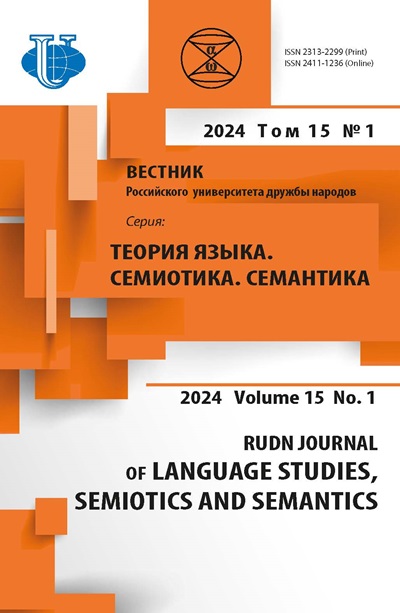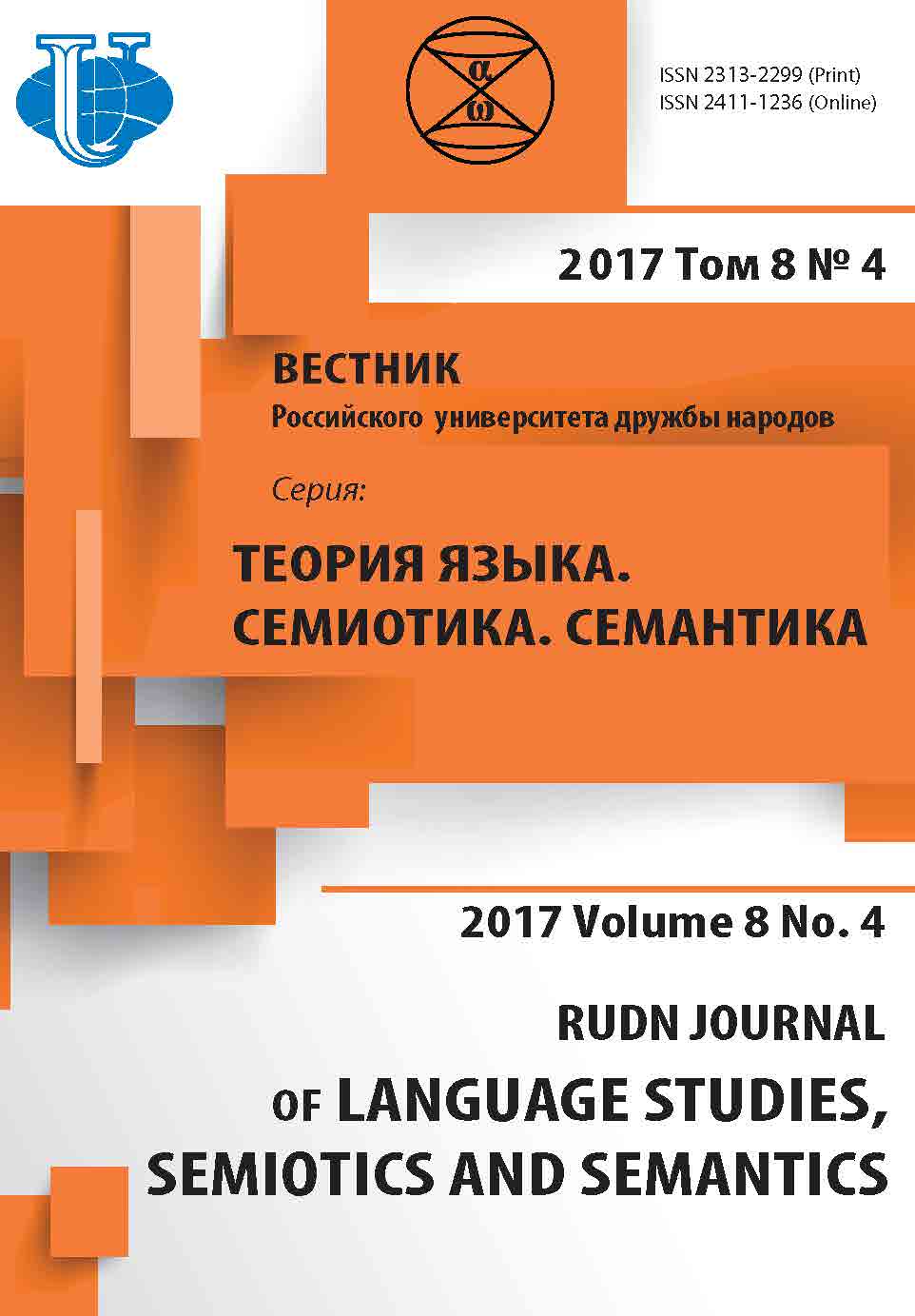VARIABILITY OF ENGLISH AND RUSSIAN LANGUAGES IN THE LIGHT OF THE LINGUISTIC CONCEPT OF G.P. MELNIKOV
- Authors: Markova E.A1, Todorova I.D1
-
Affiliations:
- RUDN University
- Issue: Vol 8, No 4 (2017)
- Pages: 1207-1218
- Section: Articles
- URL: https://journals.rudn.ru/semiotics-semantics/article/view/17999
- DOI: https://doi.org/10.22363/2313-2299-2017-8-4-1207-1218
Cite item
Full Text
Abstract
The article presents the authors’ attempt to explain the territorial and demographic impera-tive of the English language and variability of the Russian language from the position of the linguistic theory of Russian scientist G. P. Melnikov. According to the founder of the theory of World Englishes at the present time in there is no any appropriate methodological basis for the explanation of the English language’s “triumphal march” in linguistics. Many works devoted to the variation of the Russian language, as well as English are not considered from the standpoint of systemic linguistics. It appears to the authors that a sys-tematic approach G. P. Melnikov has great explanatory power in the issue of linguistic vitality of these two languages. The authors rely on the concept of internal determinant as a specific attribute of the system developing in the direction of optimal adaptation to the completion of the super-system functional request and the external determinant that conditions functional requirements of the super-system. The article con-tains the language situations analysis of the Russian language as a language with event determinant and the language situations analysis of the English language as a language with occasional determinant.
About the authors
Elena A Markova
RUDN University
Author for correspondence.
Email: abellen@yandex.ru
Markova Elena Andreevna, senior lecturer of the Foreign Languages Department at the Faculty of Humanities and Social Sciences of the RUDN University, doctoral candidate; scientific interests: theory of language, systemology, linguistic typology, typology, vitality of languages
10a, Miklukho-Maklaya Str., Moscow, Russia, 117198Ivelina D Todorova
RUDN University
Email: ivelina_todorova@mail.ru
Todorova Ivelina Dimovna, post-graduate student of the Russian Language and Intercultural Communication Department at the Faculty of Humanities and Social Sciences of the RUDN University; scientific interests: systemology, linguistic typology, typology, vitality of languages
10a, Miklukho-Maklaya Str., Moscow, Russia, 117198References
- Alpatov, V.M. (2001). History of linguistic studies. Moscow, Yazyki slavyanskoj kul'tury. pp. 225—226. (In Russ.).
- Bahtikireeva, U.M. (2014). Russian a poly-national language? Russian Journal of Linguistics, 2. (In Russ.).
- Bahtikireeva, U.M. (2005). Artistic bilingualism and features of the Russian artistic text of a bilingual writer. Dis.. d. filol. nauk. Moscow. (In Russ.).
- Bolton, K. (2012). On the current state of the theory of English language contact variants (World Englishes): approaches, problems and controversial issues, International magazine of social and humanitarian studies. Individuality. Culture. Society. Vol. XIV. Issue. 3. no 73—74. pp. 173—188.
- Valentinova, O.I., Denisenko, V.N., Preobrazhensky, S.YU. & Rybakov, M.A. (2016) Sy stemic approach to th e basis of philological thought, Moscow, Publishing House YASK, 440. (Language. Semiotics. Culture). (In Russ.).
- Valentinova, O.I., Preobrazhenskiy, S.Yu. & Rybakov, M.A. (2016) Forgotten Paradigms of Linguistics: Systemology by G.P. Mel'nikov [Forgotten paradigms of linguistics: G.P. Melnikov’ s sy stemology] IN Philological sciences (Scientific Essays of High Education) № 5. 18—39. (In Russ.).
- Voroncova, G.N. (1960). Essays on the grammar of the English language. Moscow, Literature Edition in Foreign languages, 41. (In Ru ss.).
- Gvishiani, N.B. (1979). Poly-functional words in language and discourse: tutorial. Moscow, High Education, 200. (In Russ.).
- Dolgina, E.A. (2010). Poly-functionality of English articles in language and discourse, Moscow, Librokom. (In Russ.).
- Zubkova, L.G. (2010). The principle of sign in the system of language. Moscow, Language s of Slavonic culture. (Studia philologica). URL: http://philologos.narod.ru/ling/zubkova.htm (22.02.2012). (In Russ.).
- Kachru, B.B. (2012). World variants of English language: agony and ecstasy IN International magazine of social and humanitarian studies. Individuality. Culture. Society. Vol. XIV. Issue 4. № 75—76. 145—165.
- Kolesov, I.YU. (1993). Theoretical basis of verbal lexemes grammatization in English IN Categorical, formal, functional and pragmatic aspects of language, SPb.: RGPU named by A.I. Gercena, 34—40. (In Russ.).
- Lutin, S.A. (2006). The origins and essence of the deterministic approach to the language as a system ( the memory of G.P. Melnikov). Russian Journal of Linguistics. № 2 (8). pp. 13—21. (In Russ.).
- Makoveeva, S.E. (2001). Particles in Modern English: Genesis and Functional Aspect, Dis.. d. f ilol. nauk: 10.02.04. Arhangel'sk. (In Russ.).
- Mel'nikov, G.P. (2003). Systemic typology of languages. Moscow: Nauka. (In Russ.).
- Mel'nikov, G.P. (2000). Systemic typology of languages: synthesis of morphological classification of languages with a stadial. Moscow, RUDN. (In Russ.).
- Moskvicheva, S.A. (2010). Category of polysemy through the prism of the linguistic sign essential characteristics IN Psychological research: electronic scientific magazine, № 2 (1 0). [we b-resource] URL: http://psystudy.ru (accessed: 04.08.2017). (In Russ.).
- Proshina, Z.G. (2011). Legitimacy of “non-native” English variants. International magazine of social and humanitarian studies. Individuality. Culture. Society. Vol. XIII. Issue 4 (67—68). pp. 164—165. (In Russ.).
- Proshina, Z.G. (2012). A change of the language education paradigm? (Introduction into the article by A. Macudy) IN International magazine of social and humanitarian studies. Individuality. Culture. Society. Vol. XIV. Issue. 2. № 71—72. (In Russ.).
- Smit, L.I. (2010). English as a subsidiary language of international communication IN International magazine of social and humanitarian studies. Individuality. Culture. Society. № 3(57—58). pp. 149—154.













